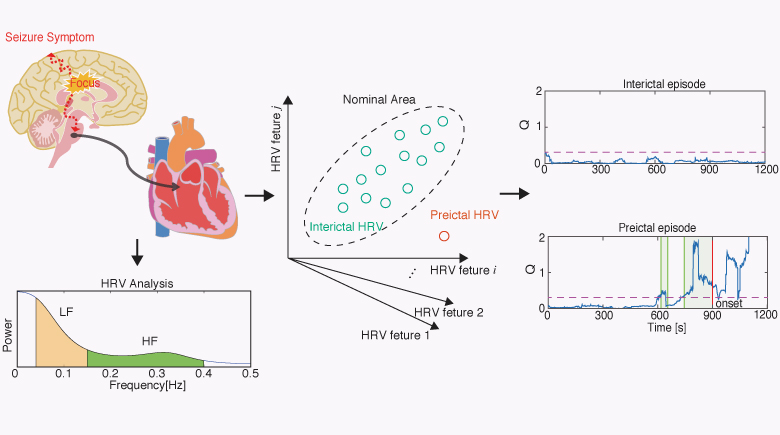Epilepsy is a common neurological disorder that causes seizures with various symptoms such as convulsion and loss of consciousness. Approximately 30% of epileptic patients do not achieve seizure control even though they use the best available medications. If patients with intractable epilepsy can be given a warning prior to the seizure onset, their quality of life (QoL) may be improved because their safety can be ensured. The RR interval (RRI) fluctuation in an electrocardiogram (ECG), called heart rate variability (HRV), is a well-known phenomenon which reflects the autonomic nervous function. Changes in HRV in preictal phase have been reported because epileptic seizures can lead to changes in cardiac autonomic nervous function.
We proposed a new epileptic seizure prediction algorithm based on HRV. The proposed algorithm is as follows: 1) extract eight typical HRV features from RRI data of epileptic patients, and 2) predict epileptic seizures by utilizing an anomaly monitoring technique whose inputs are the extracted HRV features. Multivariate statistical process control (MSPC), which is a well-known anomaly monitoring method used in the field of process control, is used for epileptic seizure prediction. We applied the proposed method to the clinical data collected from fourteen patients. In the collected data, eight patients had a total of eleven awakening preictal episodes and the total length of interictal episodes was about 57 hours. The results produced accurate predictions (91%) for epileptic seizures, and there were few false-positives (0.7 times/hour). These result shows that it is possible to make accurate predictions of epileptic seizures. The proposed method can be used in daily life, because HRV can be measured easily by using a wearable sensor.
Keywords: Epilepsy, heart rate variability analysis, multi-variate statistical process control (MSPC), seizure prediction


